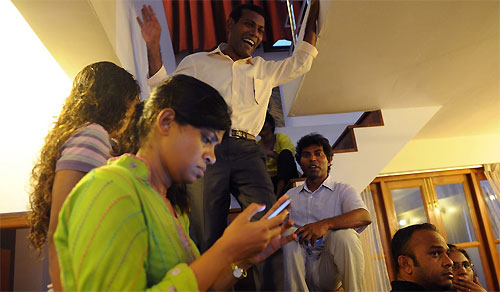|
Maldivian democracy and Nasheed's integrity
Daily Mirror Editorial Feb 9, 2011 | |
 Whatever triggered the unrest and the growing unpopularity of Maldivian President Mohammed Nasheed among the citizens, his resignation comes at a time when democratic principles are extinct. Nasheed was the first democratically elected Maldivian president, whose appointment ended the three- decade autocracy of Maumoon Abdul Gayoom. He was the change people were anticipating; in the wake of his election victory people thought they found their leader and the country- its symbol of good governance. Even though, he did not disappoint his people entirely, during the immediate past, he was often labelled 'anti-islamic' for his liberal views. What upset his universe was his order to arrest a senior judge; a move, interpreted by the political critics as that of a dictator. True enough, interference in judiciary was not to be brooked at any rate even if it was committed by the most democratically governing president in the world. In fact, his resignation is a lesson to any ruler who misuses his powers to put undue pressure on independent authorities such as the judiciary that are constitutionally formed to mete out justice. However, Nasheed was someone who took the long route to the helm. A coup would have been easier for him, given the number of people who was crowding his public rallies. Yet, he detested bloodshed. Instead, he spent the best years of his life behind bars and in exile. This places him on the same raw with the likes of Aung Saan Su Ki who would have lived better lives with respectable professions and comfortable homes away from the hassle, minus of course the people they had earned. What makes his contribution to politics more crucial than those of others is that he considered public support as the parameter of good governance. Thus he was jubilant in his victory and graceful in admitting that he lost it. Pandemonium in Male also goes to show that people, irrespective of their political literacy, will act on the status quo of any situation. It does not count whether they take to the roads against a leader who had the best vision for their country, neither does it matter to them that, once upon a time, they had voted him into power. Hence, the very people who had protected him and tried to avoid his arrest at the Male Square a few years ago, would have been among the thousands who took to the roads earlier this week. To the politicians in the neighboring countries who would hold onto their perks until their last breath and haunt their seats after their death, Nasheed was the epitome of boldness and integrity who let his actions do the talking. As Sri Lankans we can't help but wonder if we had the same impulses as those of the Maldivians, would we be permanently living on the roads given the magnitude of the impunities committed by our politicians. No doubt, Nasheed’s role as a martyr would be subject to many biographies and opinion pieces in the days to come. The changes he brought about to the country would be much talked about. The same people who rejected him would admit that he was a man of integrity. Perhaps, they will gradually understand that, truthfulness is hard to come by. Now, the Maldives is under a new president. At the end of the day, people emerge victorious; whether their battle could be justified or not is another matter. The rest is history. Source: Daily Mirror - Sri Lanka
|
|